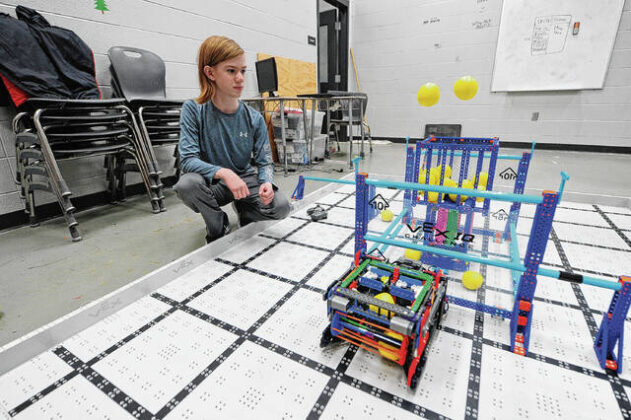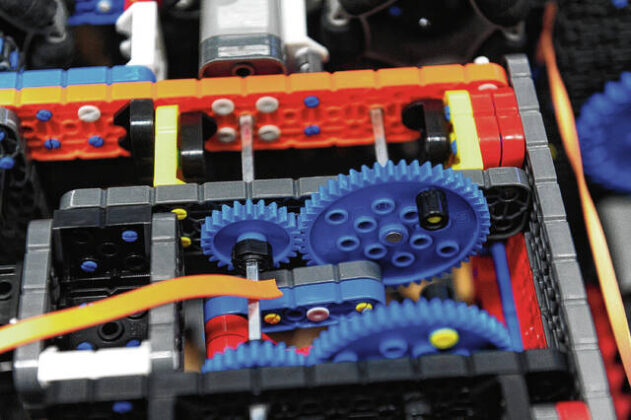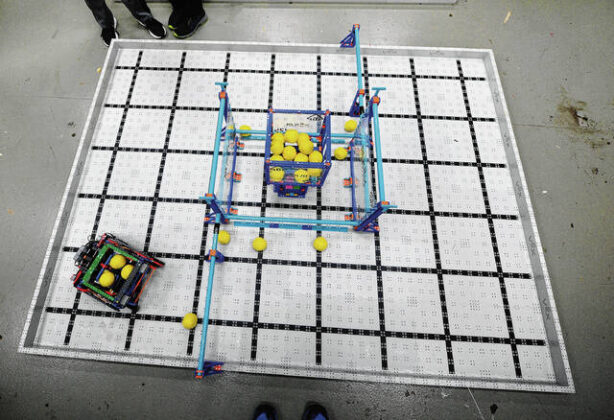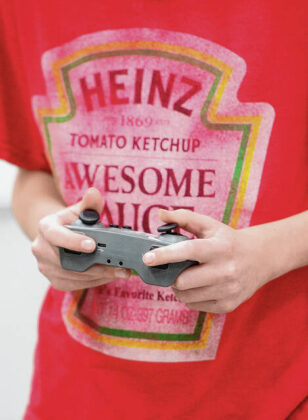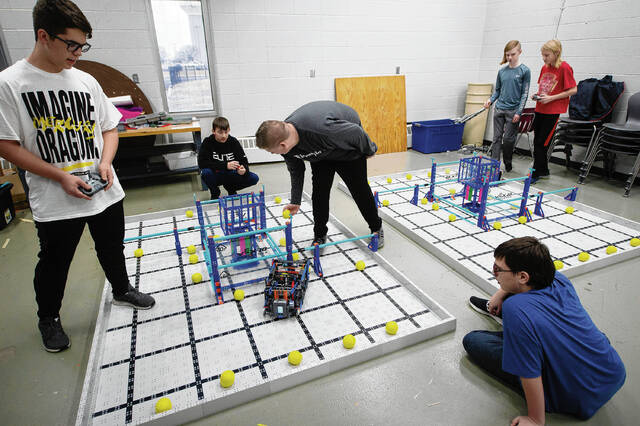
Members of the New Palestine Junior High robotics team work with robots they designed in class. The team qualified for the Indiana VEX Robotics State Championship.
Tom Russo | Daily Reporter
HANCOCK COUNTY – Dozens of students throughout Hancock County have been busily preparing their robots for the Indiana VEX Robotics State Championship next month.
The event returns to Lucas Oil Stadium in Indianapolis on March 12 after competing virtually last year.
Nearly 250 teams in elementary, middle, junior high and high schools have qualified so far, and more will likely qualify in ongoing tournaments this weekend.
Winners at the state championships will advance to the world championships in Dallas, Texas in May.
The robotics room was abuzz with activity after school last week at New Palestine Junior High School, where robotics club members tested out their robots against those built by a neighboring home school team.
The school’s team sponsor, Brandon Wilson, has been involved with all three of his sons’ robotics teams over the years. Wilson is an engineer for Roche Diagnostics.
His oldest sons, J.C. and Benjamin, now do robotics at New Palestine High School.
His youngest son, Joe, is on the team at the junior high.
Wilson thinks robotics is a great way for kids to develop teamwork and critical thinking skills.
“It shows them the fun of competition while allowing them to problem solve and design things,” he said. “It also gives them the opportunity to do something with coding beyond just looking at a screen.”
Each year, VEX Robotics competitions challenge students to build and program robots to achieve a certain task within a small playing field. All teams are assigned the same task, which changes from year to year.
This year’s goal is to build a robot that can pick up balls and launch them into a tower.
While the robot’s task may sound simple, designing a robot to do so teaches kids a great deal about teamwork and engineering, Wilson said.
“We all have to work as a team, so we maximize the amount of workforce we have,” said Carson Eyerman, 14, a member of New Palestine Junior High School’s club.
Each club can have several teams, consisting of three or four students each. Each is given a job during competition.
Joe Wilson likes driving, or controlling the robot, the best.
“The goal this year is to pick up all the balls on the field as fast and efficiently as you can,” he said.
Robots are typically controlled by a remote, but teams also develop programs which make a robot run through the challenge autonomously.
While most students dream of qualifying for the state championships and advancing the world championship, they also have a great time simply tinkering with the robots alongside their teammates after school.
Robotics is a fast-growing focus at schools throughout the world.
The Montessori Science Academy in New Palestine has even incorporated robotics into its daily curriculum.
“It’s right next to math, reading, language arts and history. Students get at least an hour to work on robotics every day,” said Brian Wheatley, the teacher at the school.
Some students even spend time during recess, lunch and after school working on their robots leading up to a competition, he said.
“A lot of them are pretty dedicated,” said Wheatley, who can’t say enough about how good robotics can be for kids.
“I think it’s a great program. It integrates so many things. From engineering to math to writing, it kind of pulls together everything else they’re learning,” he said.
In VEX competitions, students must present a notebook detailing their engineering and building process, and share that process with a judge.
Doing so not only enhances their design skills but their interpersonal skills, as well, said Wheatley, who currently has four teams that have qualified for this year’s state championships.
This is the fifth year robotics has been taught at the New Palestine Montessori school.
“In that time, the biggest impact I’ve seen it make on kids is confidence,” said Wheatley. “They definitely gain confidence by getting in the program – confidence in their abilities, their mathematics. They’re calculating gear ratios. They’re understanding physics concepts and mechanical engineering concepts because they build these robots from scratch,” he said.
“They build them, test them and rebuild them over and over again until they get them the way they want it.”
Even kids as young as second graders can learn basic engineering concepts through robotics, said Wheatley, which can serve as the building blocks for essential skills in the future.
“We want to make sure our kids are prepared for the future,” he said. “Even if they don’t end up working in robotics, there’s a lot of careers where they’ll be around that type of technology, so starting them early seems like a good investment.”

